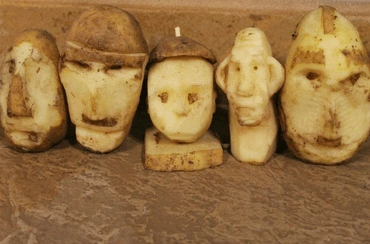Head

The head is the part of us that is highest, which means in a representative sense that it is what is closest to the Lord. Because of this the head represents what is inmost in us, the thing at the center of our being. In most cases this means intelligence and wisdom, since most of us are in a state of life in which we are led by our thoughts and reason. In the case of the Lord, however, it often represents His perfect love. And in many cases the head is used to represent the whole person.
(Odkazy: Apocalypse Explained 577; Apocalypse Revealed 538, 823; Arcana Coelestia 7859, 9656, 10011)
Ten
In most places in the Word, "ten" represents "all," or in some cases "many" or "much." The Ten Commandments represent all the guidance we get from the Lord in life; the ten horns on the beast of Revelation represent all power of falsity; the ten virgins with lamps in Matthew 25 represent all people of the church.
Yet in other places, ten, or especially a "tenth," signifies representing remnants, or tiny scraps of goodness preserved for the future. These can be the remnants of a church -- a few good people that can be built up into a new church. Or they can be tiny subconscious memories of love and joy which the Lord stores in each of us in early childhood, feelings He can use later to draw us toward a life of goodness and affection.
These two meanings seem nearly opposite, but they're actually not. Love is whole and indivisible, so that the tiniest feeling buried inside someone contains all the elements of the love it can become. In a similar way, a remnant of a church that has preserved that church's knowledge has everything it needs to grow into a new church. In a sense, then, those remnants are indeed "all," they're just a version of "all" that is still in a state of potential.






